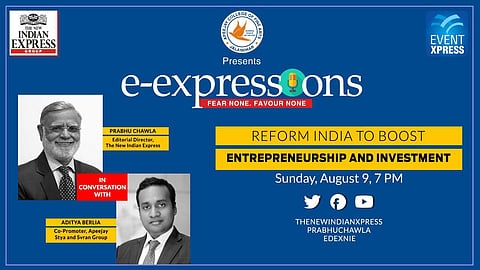

The new National Education Policy is the kind of wholesale reform that needs to come up in other sectors as well to encourage entrepreneurship and investment, said Aditya Berlia, Co-Promoter, Apeejay Stya and Svran Group. "NEP is a brilliant policy. I have full faith in the NEP. The new NEP is the kind of wholesale reform — although it's just a policy we have to still wait for the actual law — that needs to come into the industry as well. That is the new deal for India because the current deal is not working, COVID-19 has really pointed out a lot of holes in this old deal. Now is a great time to come up with something new and say 'look we had the courage to do demonetisation, to come up with a new NEP,' so we have the courage to do a complete renovation for our ecosystem to encourage entrepreneurship and investment. That is what I am hoping for," said Aditya.
He was in conversation with The New Indian Express' Editorial Director Prabhu Chawla at TNIE's e-expressions series on the topic Reform India to boost entrepreneurship and investment on August 9.
Speaking about reform, Prabhu Chawla added that it should be in the pattern of equitable distribution of wealth. "What has happened during COVID, all the service sectors have broken down, they were all closed. We don't have enough people getting enough money in their hands to sustain the service sector. You want people to fly more, buy more but imagine how many cars will the middle class ultimately buy? People who don't have a car, or scooter or a one-bedroom house how will they buy more to sustain the development of the service sector? Then what is the reform here? Reform means you have to go back to the demand-led model rather than supply model. Basically, reform should be in the pattern of distribution of wealth — equitable distribution of wealth."
Responding to Prabhu Chawla on what reforms he would like to see in the next ten years, Aditya said, "I would love to see them in the next six months, 10 years is too long. First, I would say there are two philosophical changes that have to happen. Ease of doing business is the wrong term, it should be ease of transaction. Transaction also means getting a subsidy from the government, not just profit-making transactions but everything else. When people talk about growth, it means millions of transactions done at a specific speed and how fast or easily you can do it. Secondly, India competes globally now and not just with a few countries. Anything that we do has to be globally benchmarked and on a certain level."
Speaking about a few areas that he would like to see major reforms in, Aditya mentioned land and real estate development, a level playing ground for small and medium enterprises, taxation and manufacturing. "India needs a broader civil service. Reform is needed there, India right now is so understaffed in key policy positions, you can't build a four trillion economy like that. My plea to the current government is that they come up with newer and bolder reforms. The number of people making decisions in the government needs to be expanded too. India needs a 21st-century governance system. We already saw how the Digital India initiative has not taken off as it should have, given the COVID-19 situation, these lessons should be kept in mind and we should grow from that," he added.
Aditya also added that the government cannot dwell on 14th-century ideas or thinking in efforts to build a 21st-century economy. "Wholesale reforms are important — we need 21st-century laws, policies, support systems in the infrastructure. For example, the total central budget for higher education that is spent is equal to the annual budget of one of the top ten private universities in the US. There are 20 companies in the world that have higher revenue than the entire India budget combined. So when we look at numbers, we need to acknowledge as a society that unless we fundamentally enact the reforms, it won't happen. We have to do it the way we did demonetisation — overnight, quick, immediate. But if we do this incremental bit by bit, my worry is by the time the government gets to more reforms, it might get from vision 2020 to 2030 and in ten years vision 2100. We need those reforms today," explained Aditya.
